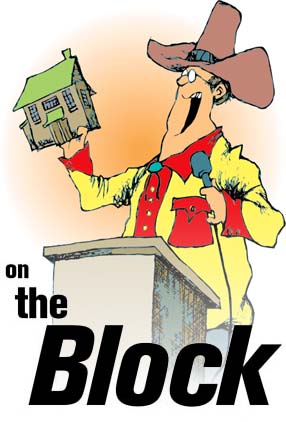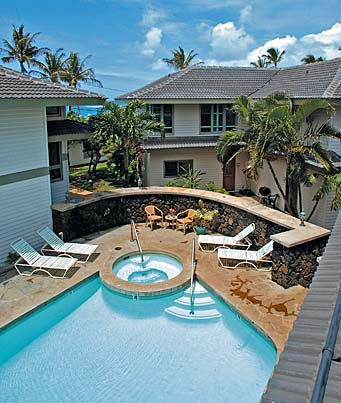
A small but growing
number of Americans are
using auctions to sell their
homes, including in Hawaii
Bob and Patty Rolland, owners of a four-villa resort on Kauai's south shore, are about to roll the dice.
Auction your home?
Homes that will do well at auction generally share these characteristics, among others:>> Their value falls within the top 1 percent or 2 percent of the market.
>> They have unique qualities that give them sizzle, such as great views or custom architecture.
>> They are tough to appraise because they are in upwardly-moving markets or cannot be compared with other properties in the same market.
Source: Steven Good, chairman of the National Auction Forum
No, the Rollands aren't going to Vegas. Instead, they've chosen to join an increasing number of real estate owners who are willing to take a gamble on their property by putting it on the auction block.
While auctions are the normal way to sell property in Australia and New Zealand, in the United States real estate auctions are more commonly associated with distressed property and the courthouse steps.
But the use of auctions as a marketing tool in the real estate industry is growing, as sellers of high-end homes have found it's a gamble that can pay off.
Home auctions are still a relatively rare approach in Hawaii, but industry leaders have said as more high-end properties like the Rolland's resort go on the auction block, the method could take hold. And some point out it's not that different from the conventional real estate market, where consumer demand is driving up prices quicker than a country auctioneer.
"If you think about it, Hawaii already has an auction market," said Steven L. Good, chairman and Chief Executive Officer of Chicago-based Sheldon Good and Company Auctions LLC. "What's different is that an auction takes out the unpleasantness of the real estate business. The question is reduced to yeah or nay."
True value
The real estate auction industry began to pick up steam in the 1980s when the saving and loan industry went belly-up. Following the crisis, massive amounts of commercial and residential real estate were sold at auction. In today's market, it's not uncommon to see wealthy people who own trophy property, like the Rollands, choosing auctions for the speed of the sale and the capacity of the auction process to determine the true market value, said Good, who also serves as chairman of the National Auction Forum, a million-strong professional trade organization of auctioneers.
"We're anticipating handling some auctions in Hawaii in the next six months," Good said. "It's a really strong market."
The value of all real estate sold at auction grew from $10 billion in 1981 to $58 billion in 2002, according to the National Association of Realtors.
"It's a pretty small percentage of the total real estate market, but it's up quite a bit," said Walter Molony, spokesman for the National Association of Realtors, adding real estate auctions are no longer seen as marketing tools of last resort.
"An auction is a wonderful way of garnering a premium when you are dealing with a desirable product that is not easily valued," Good said. "Trophy properties do well at auction for the same reason that a Renoir or a Van Gogh is goes on auction -- it generates a better price."
While most home buyers still use the multiple listing service and a Realtor to find property, the number of bidders at real estate auctions also is growing, according to industry numbers. Real estate auction bidders increased by 27.6 percent to more than 625,000 in 2002, the most current data available.
Buyers like the quick sales process and the notion that they, not the sellers, are setting the price, said William Bone, president and chief executive officer of the National Auction Group Inc., the Alabama-based company that is handling auction proceedings for the Rollands. In 1999, the company sold a Maui estate and the following year it handled a ranch in Kailua-Kona, he said.
They also like the entertainment and drama of an auction, Bone said, adding participation from people like former presidential candidate Ross Perot; Mary Kay Ash, the late cosmetics queen; and real estate maverick Donald Trump have taken the process to a whole new level.
"It's also just another way for rich people to have some fun," he said.
Hono Kai Villas, an oceanfront four-villa resort on Kauai, hits the auction block June 10.
Speed counts
Robert Rolland said he decided to put his oceanfront resort on the auction block because it would maximize advertising and extend the range of buyers."The people, on average, who would come through buying units might not fit the criteria of what I'm looking for," Rolland said. "Having an auction is a wonderful way to stay in control and be apprised of what the market is."
The streamlined auction process also appealed to Rolland, who said he's in a hurry to retire and get out of the resort business.
Auctioneers typically take 45 days to market the property by printing out glossy brochures, advertising in newspapers and magazines around the country and contacting people who are known to travel the county bidding on property. The advertising and promotion is charged to the seller, but it's usually well below the cost of a Realtor's commission, Rolland said.
After an advertising campaign generates interest, the auction house will hold an open house to give buyers a chance to eye the property and determine their bidding range, said Sue Levin, the auction consultant assigned to the Rolland's sale.
On auction day, in this case June 10, the seller hosts a veritable party complete with drinks, pupus and entertainment. After the bidding takes place, the seller can determine if he wants to accept the price or put the property on the conventional market.
If an acceptable price is determined, the buyer typically pays about an additional 10 percent premium over the purchase price as the auctioneer's commission and is given 30 days to close the sale.
— ADVERTISEMENTS —
— ADVERTISEMENTS —


